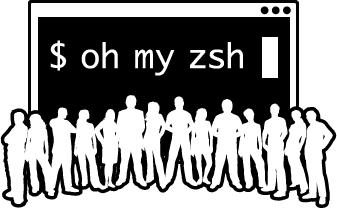oh-my-zsh is an open source, community-driven framework for managing your ZSH configuration. It comes bundled with a ton of helpful functions, helpers, plugins, themes, and few things that make you shout…
“OH MY ZSHELL!”
oh-my-zsh should work with any recent release of zsh, the minimum recommended version is 4.3.9.
You can install this via the command line with either `curl` or `wget`.
curl -L http://install.ohmyz.sh | sh
wget --no-check-certificate http://install.ohmyz.sh -O - | sh
The default location is `~/.oh-my-zsh` (hidden in your home directory).
You can change the install directory with the ZSH environment variable, either
by running `export ZSH=/your/path` before installing, or setting it before the
end of the install pipeline like this:
curl -L https://raw.github.com/robbyrussell/oh-my-zsh/master/tools/install.sh | ZSH=~/.dotfiles/zsh sh
1. Clone the repository
git clone git://github.com/robbyrussell/oh-my-zsh.git ~/.oh-my-zsh
2. OPTIONAL Backup your existing ~/.zshrc file
cp ~/.zshrc ~/.zshrc.orig
3. Create a new zsh config by copying the zsh template we’ve provided.
cp ~/.oh-my-zsh/templates/zshrc.zsh-template ~/.zshrc
4. Set zsh as your default shell:
chsh -s /bin/zsh
5. Start / restart zsh (open a new terminal is easy enough…)
You might need to modify your PATH in ~/.zshrc if you’re not able to find some commands after switching to Oh My Zsh.
If you installed manually or changed the install location, check ZSH in ~/.zshrc
- enable the plugins you want in your
~/.zshrc(take a look at theplugins/directory and the wiki to see what’s possible)- example:
plugins=(git osx ruby)
- example:
- Theme support: Change the
ZSH_THEMEenvironment variable in~/.zshrc.- Take a look at the current themes that come bundled with Oh My Zsh.
- much much more… take a look at
lib/what Oh My Zsh offers…
the refcard is pretty tasty for tips.
If you want to override any of the default behavior, just add a new file (ending in .zsh) into the custom/ directory.
If you have many functions which go well together you can put them as a *.plugin.zsh file in the custom/plugins/ directory and then enable this plugin.
If you would like to override the functionality of a plugin distributed with oh-my-zsh, create a plugin of the same name in the custom/plugins/ directory and it will be loaded instead of the one in plugins/.
By default you will be prompted to check for updates. If you would like oh-my-zsh to automatically update itself without prompting you, set the following in your ~/.zshrc
DISABLE_UPDATE_PROMPT=true
To disable updates entirely, put this in your ~/.zshrc
DISABLE_AUTO_UPDATE=true
To upgrade directly from the command line, just run upgrade_oh_my_zsh
If you want to uninstall it, just run uninstall_oh_my_zsh from the command line and it’ll remove itself and revert you to bash (or your previous zsh config).
I’m far from being a zsh-expert and suspect there are many ways to improve. If you have ideas on how to make the configuration easier to maintain (and faster), don’t hesitate to fork and send pull requests!
I’m hoping to collect a bunch of themes for our command prompts. You can see existing ones in the themes/ directory.
We have enough themes for the time being. Please fork the project and add on in there, you can let people know how to grab it from there.
This project wouldn’t exist without all of our awesome users and contributors.
Thank you so much!
